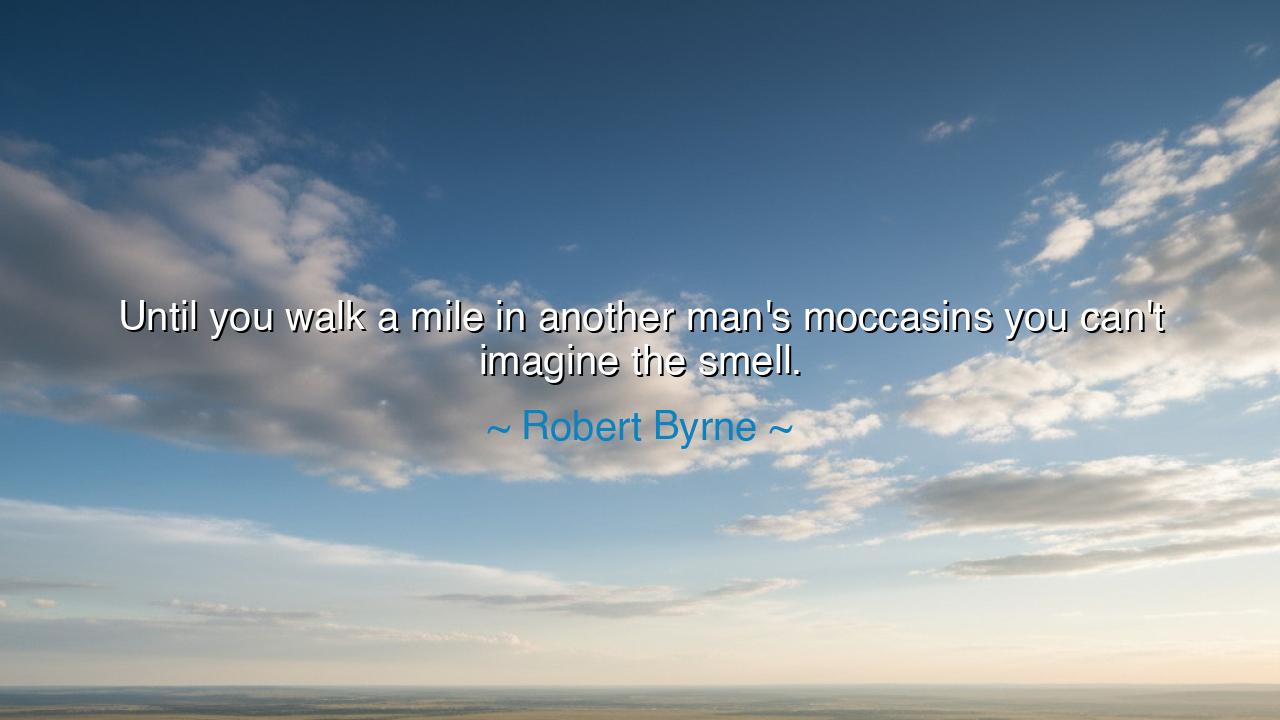
Until you walk a mile in another man's moccasins you can't






In the vast tapestry of human experience, few truths resonate more deeply than the wisdom found in the words of Robert Byrne: “Until you walk a mile in another man's moccasins, you can't imagine the smell.” This simple yet powerful statement speaks to the core of empathy, understanding, and the very nature of human connection. It reminds us that to truly understand another person’s experience—whether their pain, their joy, or their suffering—we must immerse ourselves in their journey, experiencing life from their perspective. Without this, our understanding is incomplete, and our judgments are clouded by the distance between ourselves and others.
In the ancient world, wisdom was often passed down through stories, parables, and the lived experience of great philosophers and sages. Socrates, the father of Western thought, spent his life engaging others in deep conversation, always seeking to understand their beliefs and challenge their perspectives. His method of inquiry, known as the Socratic method, was not about imposing his own views on others, but rather about encouraging individuals to think deeply about their own lives and understand the experiences of others. Empathy was a cornerstone of his teachings—understanding that to truly know another person, one must strive to see the world through their eyes.
This idea is not a modern one. The Native American proverb, which Byrne echoes in his words, reflects a timeless truth about the importance of perspective. The moccasins are symbolic of the paths walked by others, of the lives lived in ways we may never fully comprehend unless we choose to walk those paths ourselves. When we remain outside of another person’s life experience, we only see the surface, the outward actions, and the public face they show to the world. We do not perceive the hidden struggles, the unseen burdens they carry, or the full depth of their humanity. It is only through true engagement that we begin to grasp the complexity of another’s existence.
In ancient stories, the theme of walking in another’s shoes appears time and again. Consider the story of King Solomon, renowned for his wisdom. In one of his most famous judgments, Solomon proposed to split a baby in half between two women who both claimed to be the mother. One woman immediately offered to give up her claim in order to save the child’s life, revealing herself to be the true mother. Solomon’s wisdom came from his ability to understand the inner heart of others, to see beyond the surface-level dispute and into the soul of each woman. He knew that true empathy was not merely about hearing words but understanding the deep, often hidden, motivations that guide human actions.
In modern times, too, there are countless stories of those who have learned to walk in the shoes of others, offering us profound lessons in empathy. Mahatma Gandhi, for example, famously sought to live simply and understand the struggles of the poor in India. He spent time living with those who had nothing, wearing their simple clothes, and engaging with their daily hardships. By immersing himself in the lives of the oppressed, he was able to lead a movement that transcended the political and became a deeply human one—focused on compassion, dignity, and the shared experience of all people, regardless of their station in life.
The lesson of Byrne’s words is one of profound humility. We live in a world where it is all too easy to cast judgment on others, to make assumptions based on superficial knowledge or limited experiences. Yet, this quote challenges us to pause, to reflect before we act or speak. Empathy requires that we step outside of ourselves and seek to understand the world from another’s point of view—something that is not always comfortable or easy, but something that makes us more complete as individuals and as a society.
In our own lives, the practical action we can take is simple yet profound: engage more deeply with the lives of those around us. When we hear someone’s story, let us not dismiss it or assume we know it fully. Instead, let us listen with open hearts and minds, seeking to understand their truth as they experience it. Whether in our personal relationships, our work, or our communities, we can all take steps to cultivate more empathy in our interactions. Let us walk alongside others, if only for a moment, so that we may truly understand the complexities of their lives and, in doing so, become richer and more compassionate in our own.
Ultimately, Byrne’s words remind us that true wisdom is not merely knowing facts or gaining knowledge, but understanding the human condition in all its forms. To walk in another’s moccasins is to honor their humanity, to acknowledge their struggles, and to offer them the respect they deserve. In doing so, we become more than just observers of life; we become participants in the shared journey of all people. Let us remember that the greatest power we have is not in our ability to judge, but in our capacity to understand. And in understanding, we find the deepest connections that bind us all together.






AAdministratorAdministrator
Welcome, honored guests. Please leave a comment, we will respond soon